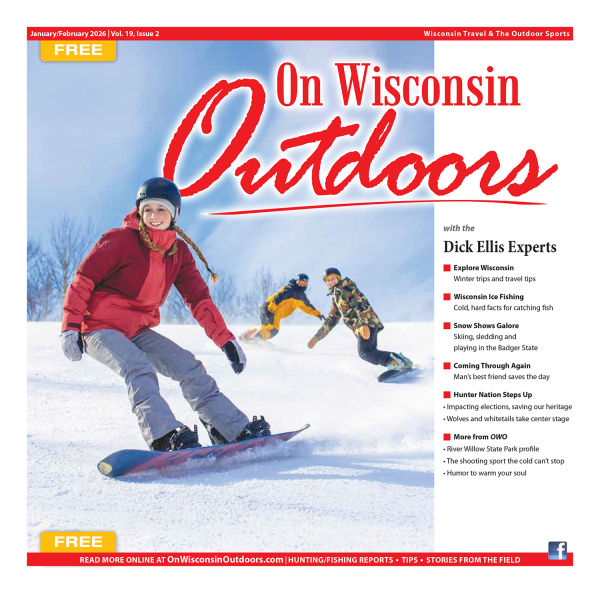Fencerows : Dancing in the Wind River Range
By John Luthens
The morning sun needled through a break in the peaks and dusted the bottom meadows as we broke base camp. Wildflowers grew in bright clusters along the slopes and we took a deep breath of the scented wind coming down from above. With a final tightening of straps and a rattling of carabineers, we shouldered our packs and headed into the Rocky Mountains.
I climbed with a mix of 21 Boy Scouts and adult adventurers from Grafton, Wisconsin’s Troop 840, and I was lucky enough to be climbing into the heart of 100,000 acres of rugged mountain country in the Wind River Range of western Wyoming. It was a venture into the Popo Agie Wilderness, meaning, in the native tongue of the Shoshone Indians, “beginning of the waters.”

Sunrise over the Wind River Range in western Wyoming.
We were at 9000 feet of elevation when the grasses and rocks gave way to pine trees and boulders. There were only the sounds of crunching rim-rock beneath our boots and the rasping of our lungs as we struggled to take oxygen into our lowland Wisconsin lungs.
On the surface, a five-mile hike may not seem daunting, but the steadily increasing elevation and 55 to 70 pounds we carried on our backs made us fight for every step. Finally, above 10,000 feet, we set down our packs and split into two separate camps along the rocky cliffs of Upper Silas Lake, a glacial outwash fed from the peaks above through a rushing series of waterfalls and a bone-chilling mountain stream.
Headaches, bloody noses, and chapped lips from the elevation were common as our bodies acclimated. The effects soon wore off or were forgotten entirely as we took in the peaks and the waters surrounding us. For four days, we danced in the high-range of the Wind River back country.

John Luthens rests on the summit of 11,000 feet.
Snow slid in glacial snake patterns along the sheltered crags and draws. The wind constantly changed directions through the branches of lodge-pole pines. The trees were ram-rod straight with branches swinging high above. Early Native Americans used the pines to build shelters. We used the shade of the trees to shelter our tents from the sun blasting off the boulders. A sharp aroma of sap and needles filled the air. At night, a whisper of wind through the boughs lulled us to sleep.
Mornings brought clouds of mosquitoes and biting gnats. I sailed a fly line along the waters below as the sun lit the highest peaks, dropping steadily downward to disperse the swarms of insects. Swirls of brook trout bubbled along the shoreline as the fish sipped their breakfast.
It was easy enough to catch a limit of trout before breakfast, but we’d packed in pounds of dehydrated food and didn’t want to pack it back out. I threw brook trout after brook trout back into the rush as Scouts came down to filter water. Powdered eggs boiled over pocket-sized stoves took the place of fresh trout; not the fairest trade, but still a fine way to start another day in the Wind River.

Mountain brook trout from the waters of Upper Silas Lake.
Time ran slower as we boulder-climbed 11,000 feet of mountain that loomed above our camp. Snow along the slopes stretched for hundred of yards and we iced down our water bottles. For the first time in my life, I went sledding in late July in nothing but a T-shirt and shorts. A snowball fight erupted and I was soundly routed by other members of the troop.
Following elk tracks back into the range, I stumbled across an unnamed glacial bowl that was fed by nothing but snowmelt. I fished and caught rainbow and brook trout by the score, feeling certain they had never before seen a man-made fly.
Far up the rocky stream bank, in the waning shadows of the mountains, our two groups met for a fellowship campfire. We traded stories of our days and carried on a solemn tradition. A vial of ashes was thrown in the coals. The ashes were the mixed remnants and legends of campfires past, stretching from the Boundary Waters of the Canadian border to the Florida Keys. In the morning, the ashes would be gathered by a chosen member, carried to be cast into another far-flung fire of the future.
The last night found us on a high ledge above the Shoshone “beginning of the waters,” watching the fading glow of orange over the western peaks. It turned to red and then to dark purple as meteors dashed across the sky and reflected in the water below. The Milky Way spanned like a rhinestone belt from peak to peak.
We talked and laughed of life, trivial conversation in any other setting. But beneath the dancing stars of the Wind River Range, with the mountains listening in eternal silence – for us, it approached the finest poetry ever spoken.









